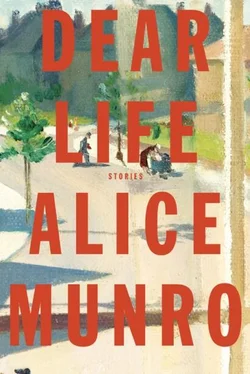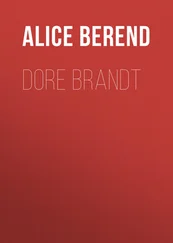Belle was away at a school in the winters. The name of the school was Bishop Strachan and she was surprised that he had never heard of it. She spelled it out. It was in Toronto and it was full of rich girls but also had girls like herself who got special money from relations or wills to go there. It taught her to be rather snooty, she said. And it didn’t give her any idea of what she would do for a living.
But that was all settled for her by the accident. Walking along the railway track, as he often liked to do on a summer evening, her father was hit by a train. She and her mother had both gone to bed before it happened and Belle thought it must be a farm animal loose on the tracks, but her mother was moaning dreadfully and seemed to know first thing.
Sometimes a girl she had been friends with at school would write to ask her what on earth she could find to do up there, but little did they know. There was milking and cooking and taking care of her mother and she had the hens at that time as well. She learned how to cut up potatoes so each part has an eye, and plant them and dig them up the next summer. She had not learned to drive and when the war came she sold her daddy’s car. The Mennonites let her have a horse that was not good for farm work anymore, and one of them taught her how to harness and drive it.
One of the old friends, called Robin, came up to visit her and thought the way she was living was a hoot. She wanted her to go back to Toronto, but what about her mother? Her mother was a lot quieter now and kept her clothes on, also enjoyed listening to the radio, the opera on Saturday afternoons. Of course she could do that in Toronto, but Belle didn’t like to uproot her. Robin said it was herself she was talking about, scared of uproot. She—Robin—went away and joined whatever they called the women’s army.
The first thing he had to do was to make some rooms other than the kitchen fit to sleep in, come the cold weather. He had some mice to get rid of and even some rats, now coming in from the cooling weather. He asked her why she’d never invested in a cat and heard a piece of her peculiar logic. She said it would always be killing things and dragging them for her to look at, which she didn’t want to do. He kept a sharp ear open for the snap of the traps, and got rid of them before she knew what had happened. Then he lectured about the papers filling up the kitchen, the firetrap problem, and she agreed to move them if the front room could be got free of damp. That became his main job. He invested in a heater and repaired the walls, and convinced her to spend the better part of a month climbing up and getting the papers, rereading and reorganizing them and fitting them onto the shelves he had made.
She told him then that the papers contained her father’s book. Sometimes she called it a novel. He did not think to ask anything about it, but one day she told him it was about two people named Matilda and Stephen. A historical novel.
“You remember your history?”
He had finished five years of high school with respectable marks and a very good showing in trigonometry and geography but did not remember much history. In his final year, anyway, all you could think about was that you were going to the war.
He said, “Not altogether.”
“You’d remember altogether if you went to Bishop Strachan. You’d have had it rammed down your throat. English history, anyway.”
She said that Stephen had been a hero. A man of honor, far too good for his times. He was that rare person who wasn’t all out for himself or looking to break his word the moment it was convenient to do so. Consequently and finally he was not a success.
And then Matilda. She was a straight descendant of William the Conqueror and as cruel and haughty as you might expect. Though there might be people stupid enough to defend her because she was a woman.
“If he could have finished it would have been a very fine novel.”
Jackson of course knew that books existed because people sat down and wrote them. They didn’t just appear out of the blue. But why, was the question. There were books already in existence, plenty of them. Two of which he had to read at school. A Tale of Two Cities and Huckleberry Finn , each of them with language that wore you down though in different ways. And that was understandable. They were written in the past.
What puzzled him, though he didn’t intend to let on, was why anybody would want to sit down and do another one, in the present. Now.
A tragedy, said Belle briskly, and Jackson didn’t know if it was her father she was talking about or the people in the book that had not got finished.
Anyway, now that this room was livable his mind was on the roof. No use to fix up a room and have the state of the roof render it unlivable again in a year or two. He had managed to patch it so that it would do her a couple of more winters, but he could not guarantee more than that. And he still planned to be on his way by Christmas.
The Mennonite families on the next farm ran to older girls, and the younger boys he had seen were not strong enough yet to take on heavier chores. Jackson had been able to hire himself out to them, during the fall harvest. He had been brought in to eat with the others and to his surprise found that the girls behaved giddily as they served him, they were not at all mute as he had expected. The mothers kept an eye on them, he noticed, and the fathers kept an eye on him. He was pleased to know that he could satisfy both sets of parents. They could see that nothing was stirring with him. All safe.
And of course with Belle not a thing had to be spoken of. She was—he had found this out—sixteen years older than he was. To mention it, even to joke about it, would spoil everything. She was a certain kind of woman, he a certain kind of man.
The town where they shopped, when they needed to, was called Oriole. It was in the opposite direction from the town where he had grown up. He tied up the horse in the United Church shed there, since there were of course no hitching posts left on the main street. At first he was leery of the hardware store and the barbershop. But soon he understood something about small towns which he should have realized just from growing up in one. They did not have much to do with each other, unless it was for games run off in the ballpark or the hockey arena, where all was a fervent made-up sort of hostility. When they needed to shop for something their own stores could not supply they went to a city. The same when they wanted to consult a doctor other than the ones their own town could offer. He didn’t run into anybody familiar, and nobody showed a curiosity about him, though they might look twice at the horse. In the winter months, not even that, because the back roads were not plowed and people taking their milk to the creamery or eggs to the grocery had to make do with horses, just as he and Belle did.
Belle always stopped to see what movie was on though she had no intention of going to see any of them. Her knowledge of movies and movie stars was intensive but came from some years back, something like Matilda and Stephen. For instance she could tell you who Clark Gable was married to in real life before he became Rhett Butler.
Soon Jackson was going to get his hair cut when he needed to and buying his tobacco when he had run out. He smoked now like a farmer, rolling his own and never lighting up indoors.
Secondhand cars didn’t become available for a while, but when they did, with the new models finally on the scene, and farmers who’d made money in the war ready to turn in the old ones, he had a talk with Belle. The horse Freckles was God knows how old and stubborn on any sort of hill.
He found that the car dealer had been taking notice of him, though not counting on a visit.
Читать дальше












